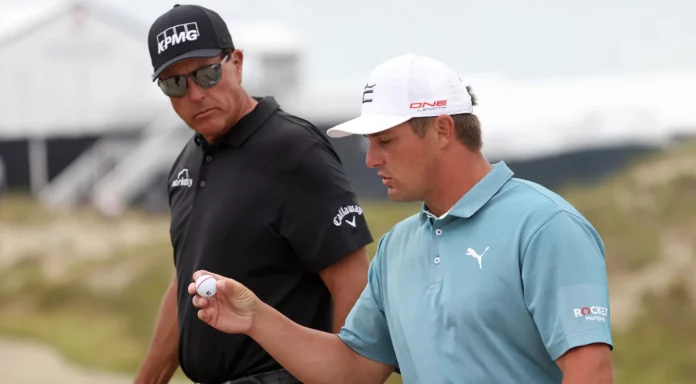Major champions Phil Mickelson of San Diego and Bryson DeChambeau of Clovis are among 11 players who have defected to LIV Golf and have filed an antitrust lawsuit against the PGA Tour, it was reported first on Wednesday by the Wall Street Journal.
Talor Gooch, Hudson Swafford and Matt Jones of Australia, who are involved in the lawsuit, also are seeking a temporary restraining order that would allow them to play in the first event of the PGA Tour’s FedEx Cup playoffs, the FedEx St. Jude Championship next week at TPC Southwind in Memphis, Tenn.
Gooch, Swafford and Jones had enough points in the FedEx Cup standings to finish in the top 125 and qualify for the opener had they not been among 17 players who were suspended by the PGA Tour for jumping to LIV Golf.
Last month, LIV golfers Ian Poulter of England, Branden Grace of South Africa, Adrian Otaegui of Spain and Justin Harding of South Africa won a temporary restraining order from an arbiter in the United Kingdom to play in the Genesis Scottish Open, which is co-sanctioned by the PGA Tour and DP World Tour.
Two-time major champion Greg Norman of Australia, a member of the World Golf Hall of Fame, is commissioner of LIV Golf, backed by the Saudi Arabian government, which paid huge signing bonuses to the players who made the move.
Norman has urged LIV Golf players to challenge the PGA Tour’s suspension and threatened litigation threats in an open letter.
Tiger Woods is one of many players who turned down other lucrative offers.
Dustin Johnson, Patrick Reed and Kevin Na of Diamond all resigned from the PGA Tour to join LIV, and Henrik Stenson of Sweden lost his position as captain of the European Ryder Cup team for the matches next year in Rome for making the move.
“We have been preparing to protect our membership and contest this latest attempt to disrupt our Tour, and you should be confident in the legal merits of our position,” Commissioner Jay Monahan said in a statement sent to PGA Tour members. “Fundamentally, these suspended players—who are now Saudi Golf League employees—have walked away from the (PGA) Tour and now want back in.
“ … As you know, players (who defected) did not receive the necessary conflicting event and media rights releases—or did not apply for releases at all—and their participation in the Saudi Golf League/LIV Golf event is in violation of our Tournament regulations. The same fate holds true for any other players who participate in future Saudi Golf League events in violation of our Regulations.”
Said Davis Love III, a member of the PGA Tour Board: “These guys are friends of ours, but they broke a rule, and unfortunately now they are suing us and this is going to cost us money. It’s disappointing. Greg Norman is challenging our way have life, trying to take money out of our pockets and from our charities, and I don’t have any time for him.”
A provision in the PGA Tour Player Handbook and Tournament Regulations, written and approved by the players, says that PGA Tour members acknowledge the commissioner, the Tour’s policy board and the appeals committee have the authority to permanently ban a member from playing in Tour co-sponsored, approved or coordinated tournaments if the member violates its regulations.
In addition, the handbook also provides that a player ceases to be a member of the PGA Tour if, in the judgment of the policy board, the member commits a serious breach of the Tournament Regulations and the PGA Tour’s Code of Ethics.
One regulation in the handbook prohibits PGA Tour players from playing in outside events when there is a PGA Tour-approved or sponsored event taking place on the same week. Players who reach the 15-event minimum (which members must meet as a condition of holding membership voting rights) are eligible for three conflicting-event releases per season, and because of that many were allowed to play in the Saudi Invitational earlier this year.
Others named in the lawsuit include Poulter, Abraham Ancer of Mexico, Pat Perez, Jason Kokrak, Carlos Ortiz of Mexico and Peter Uihlein.
The lawsuit and application for a temporary restraining order were filed in the U.S. District Court for the Northern District of California, headquartered in San Francisco.

